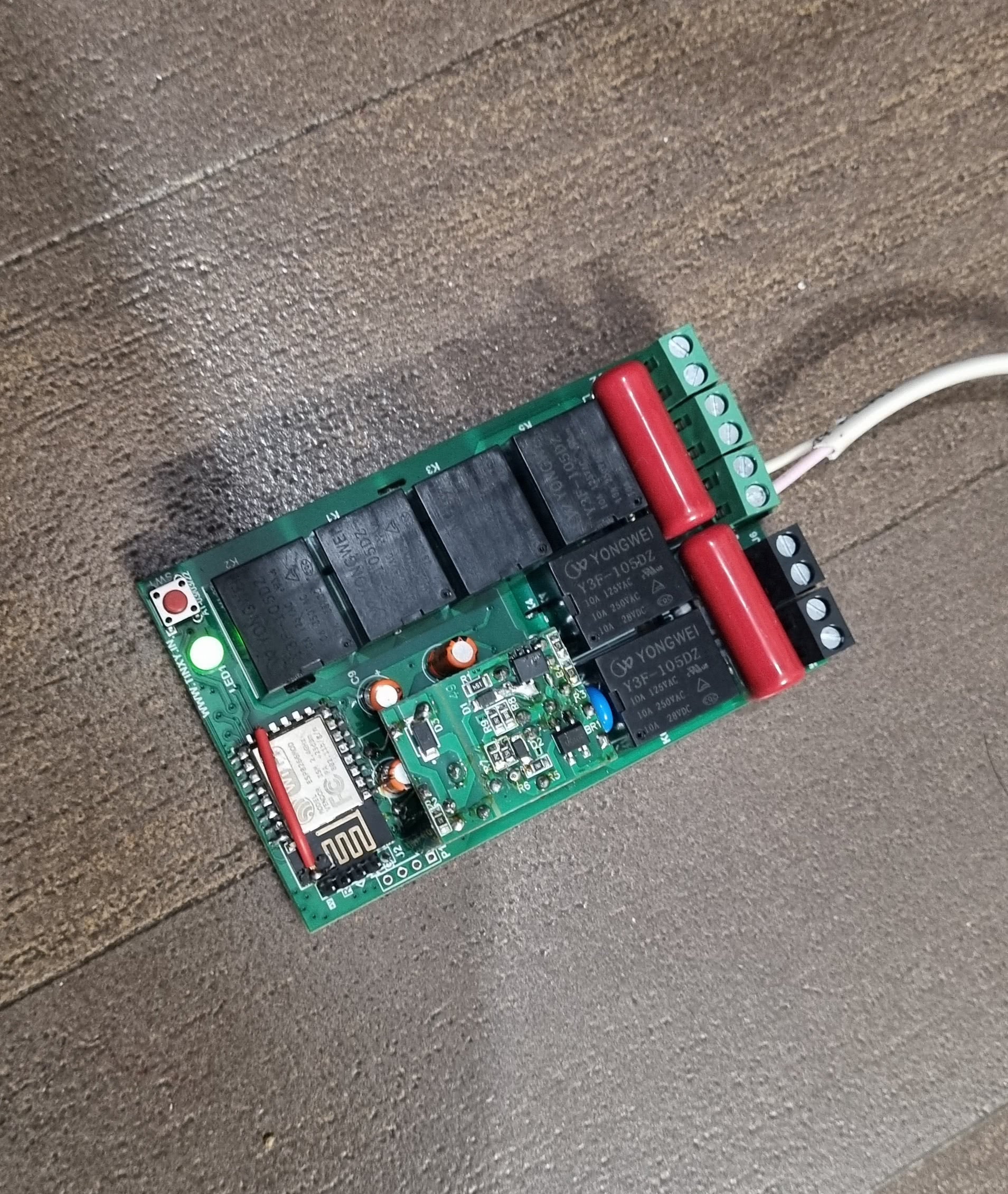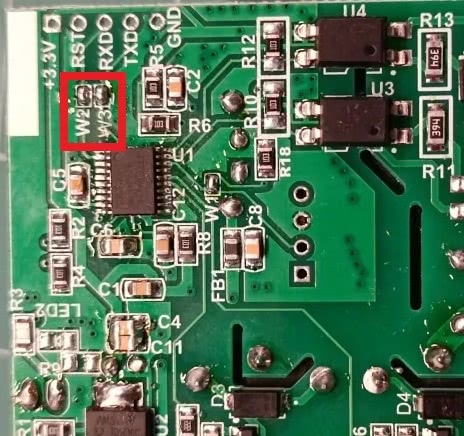Tinxy 4N with Fan Regulator
Tinxy 4 Node Retrofit Module with Fan Regulator
Amazon Link


Preparing the device for flashing
Start by carefully removing the heat shrink sleeve. Next, desolder the W2 and W3 bridges located on the backside of the Tinxy board, as shown in the provided image. Connect wires from the Tinxy board's RXD, TXD, 3.3V, and GND pads to a USB TTL adapter, making sure to swap the connections for RXD and TXD.
Press and hold the Tinxy reset button while connecting the TTL adapter to your computer. Flash the firmware as soon as the ESP8266 is detected, as the soldered on ESP8266 tends to reboot if it didn't detect PWM signal from the MCU on GPIO14.
Once the flashing is complete, resolder the W2 and W3 bridges as before, remove the TTL wires, and reapply the heat shrink sleeve to complete the modification.
Note: Unlike other devices, Tinxy ESP8266 communicates with the MCU using serial data to activate the relay. So it's
necessary to disconnect the W2 and W3 serial bridge between ESP and MCU to ensure no interference while flashing and
reconnecting it is crucial to ensure proper functioning.
 Knowledge Credit:
Tinxy Forum
Knowledge Credit:
Tinxy Forum
As of 10/2024, Tinxy 4N with fan regulator devices failed flashing with the ESPHome web flasher because it uses a baud rate of 115200. If flashing doesn't work, try flashing via esptool.py where the baud rate can be set. The baud rate was identified to be 460800. If this fails in the future try other baud rates.
esptool.py Code
python3 -m esptool --port /dev/ttyUSB0 --baud 460800 --before no_reset --after hard_reset write_flash -fm dio 0x00000 firmware.bin
Esp Code
esphome:
name: tinxy-4node
friendly_name: tinxy-4node
on_boot:
- priority: 200.0
then:
- output.turn_on: gen_pwm_test
- output.set_level:
id: gen_pwm_test
level: 50%
includes:
- uart_read_line_sensor.h
output:
- platform: esp8266_pwm
id: gen_pwm_test
pin: GPIO14
frequency: 1000 Hz
- platform: template
id: fanoutput
type: float
write_action:
- uart.write: ""
esp8266:
board: esp01_1m
# Enable logging
logger:
baud_rate: 0
level: verbose
# Enable Home Assistant API
api:
encryption:
key: ""
ota:
password: ""
wifi:
ssid: ""
password: !secret wifi_password
power_save_mode: none
fast_connect: true
status_led:
pin:
number: GPIO12
inverted: yes
uart:
id: uart_bus
tx_pin: 1
rx_pin: 3
baud_rate: 9600
text_sensor:
- platform: custom
lambda: |-
auto my_custom_sensor = new UartReadLineSensor(id(uart_bus));
App.register_component(my_custom_sensor);
return {my_custom_sensor};
text_sensors:
id: "uart_readline"
name: "UART Feedback"
on_value:
then:
- lambda: |-
ESP_LOGD("main", "The current value is %s", x.c_str());
if (id(uart_readline).state == "41") {
id(relay4_wall_switch).publish_state(true);
id(relay4).publish_state(true);
} if(id(uart_readline).state == "40") {
id(relay4_wall_switch).publish_state(false);
id(relay4).publish_state(false);
}
if (id(uart_readline).state == "31") {
id(relay3_wall_switch).publish_state(true);
id(relay3).publish_state(true);
} if(id(uart_readline).state== "30") {
id(relay3_wall_switch).publish_state(false);
id(relay3).publish_state(false);
}
if (id(uart_readline).state == "21") {
id(relay2_wall_switch).publish_state(true);
id(relay2).publish_state(true);
} if(id(uart_readline).state== "20") {
id(relay2_wall_switch).publish_state(false);
id(relay2).publish_state(false);
}
if (id(uart_readline).state == "11") {
id(relay1_wall_switch).publish_state(true);
auto call = id(fan_1).turn_on();
call.perform();
} if(id(uart_readline).state== "10") {
id(relay1_wall_switch).publish_state(false);
auto call = id(fan_1).turn_off();
call.perform();
}
binary_sensor:
- platform: template
name: "Relay4 Wall Switch"
id: relay4_wall_switch
- platform: template
name: "Relay3 Wall Switch"
id: relay3_wall_switch
- platform: template
name: "Relay2 Wall Switch"
id: relay2_wall_switch
- platform: template
name: "Relay1 Wall Switch"
id: relay1_wall_switch
switch:
- platform: template
name: "Relay2"
id: relay2
optimistic: true
restore_mode: RESTORE_DEFAULT_OFF
turn_on_action:
- uart.write: '#2100#'
turn_off_action:
- uart.write: '#2000#'
- platform: template
name: "Relay3"
id: relay3
optimistic: true
restore_mode: RESTORE_DEFAULT_OFF
turn_on_action:
- uart.write: '#3100#'
turn_off_action:
- uart.write: '#3000#'
- platform: template
name: "Relay4"
id: relay4
optimistic: true
restore_mode: RESTORE_DEFAULT_OFF
turn_on_action:
- uart.write: '#4100#'
turn_off_action:
- uart.write: '#4000#'
fan:
- platform: speed
output: fanoutput
id: fan_1
speed_count: 3
name: "Fan"
on_turn_on:
- uart.write: !lambda |-
static std::string myUartStringsOn[4] = {"#1100#", "#1033#", "#1066#", "#1100#"};
if(id(fan_1).speed == 0)
id(fan_1).speed = 1;
std::string chosenString = myUartStringsOn[id(fan_1).speed];
std::vector<uint8_t> vec(chosenString.begin(), chosenString.end());
return vec;
on_turn_off:
- uart.write: '#1000#'
on_speed_set:
- if:
condition:
lambda: return (id(fan_1).state);
then:
- uart.write: !lambda |-
static std::string myUartStringsOn[4] = {"#1100#", "#1033#", "#1066#", "#1100#"};
std::string chosenString = myUartStringsOn[id(fan_1).speed];
std::vector<uint8_t> vec(chosenString.begin(), chosenString.end());
return vec;
number:
- platform: template
name: "Switch Delay"
id: "switchdelay"
optimistic: true
restore_value: true
initial_value: "60"
min_value: 5
max_value: 100
step: 1
set_action:
then:
- uart.write: !lambda |-
int multiplexer = 625 + static_cast<int>((x - 5) * 25);
String uartValue = "(";
if (multiplexer < 1000) {
uartValue += "0";
}
uartValue += String(multiplexer, DEC) + ")";
std::vector<unsigned char> uartBytes(uartValue.begin(), uartValue.end());
return uartBytes;
UART reading library
Place the uart_read_line_sensor.h library under esphome directory
#include "esphome.h"
class UartReadLineSensor : public Component, public UARTDevice, public TextSensor {
public:
UartReadLineSensor(UARTComponent *parent) : UARTDevice(parent) {}
void setup() override {
// nothing to do here
}
int readline(int readch, char *buffer, int len)
{
static int pos = 0;
int rpos;
if (readch > 0) {
switch (readch) {
case ';': // Return on CR
rpos = pos;
pos = 0; // Reset position index ready for next time
return rpos;
default:
if (pos < len-1) {
buffer[pos++] = readch;
buffer[pos] = 0;
}
}
}
// No end of line has been found, so return -1.
return -1;
}
void loop() override {
const int max_line_length = 20;
static char buffer[max_line_length];
while (available()) {
if(readline(read(), buffer, max_line_length) > 0) {
publish_state(buffer);
}
}
}
};